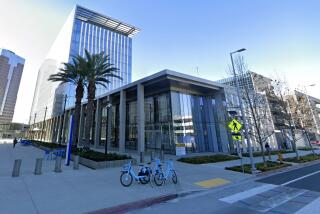New Yorkers in long lines ask: Where’s the gas?
- Share via
When Mike Williams moved to New York City from Miami four months ago, he expected cold winters and slushy streets. He was not especially worried by the arrival of a Category 1 hurricane named Sandy. They have plenty of hurricanes in Florida. But gas lines, nearly two weeks after the storm’s departure?
“I don’t get it. I’m blown away,” said Williams, asking the question on New Yorkers’ minds as they began gas rationing Friday, the latest downshift from the city’s usual rapid-fire pace and a measure aimed at relieving hours-long – sometimes daylong waits – in gas lines. “Where is the gas? “ Williams asked incredulously.
It’s a question nobody seems able to answer with total certainty, not even Mayor Michael Bloomberg or the city’s police commissioner, Raymond Kelly, who dropped by the Brooklyn station where Williams had been waiting in his SUV for 2 1/2 hours. “It’s hard to pin down,” said Kelly, not a man given to uncertainty when asked a question. “We’re still trying to figure out the details of where it is.”
FULL COVERAGE: East Coast battered by storms
Kelly said as far as he understood, part of the bottleneck was at refineries, some of which were knocked out of commission by Sandy. That meant that even after bridges and tunnels linking New York City to New Jersey and suburban Long Island and Westchester County had been reopened -- clearing the way for tankers to resume deliveries -- there was not enough fuel ready for distribution.
Bloomberg seemed similarly confounded by the fact that so few gas stations were operating. He estimated 30% were pumping.
“There has been a lot of gas coming in, but it has not gotten a lot of gas stations to open,” said Bloomberg, speaking during his usual Friday interview on the John Gambling Show on WOR radio. Several factors appeared to be at work, Bloomberg said, noting that after power came back, some fuel distribution terminals discovered that damage to their facilities was far greater than initially thought.
PHOTOS: Devastation and recovery after Sandy
He guessed that some station owners were reluctant to open if they feared the terminals were not operating at full speed. “I think part of it, really, is they just don’t think these terminals can fill the trucks anywhere near fast enough and so they wouldn’t get gas. They’d only be open for a couple of hours and maybe have to pay their employees a full day,” he said. “I don’t know.”
By midday Friday, the city, as well as neighboring Nassau and Suffolk counties on Long Island, appeared to be adjusting well to the new system. Because Friday was Nov. 9 – an odd number – only people with license plates ending in odd numbers were permitted to gas up. The restrictions don’t apply to emergency vehicles, commercial vehicles such as rental cars and taxis, or to people not in vehicles.
“We’ve seen no problems,” said Kelly, as he gamely posed for pictures with the giddy gas station crowd, whose main diversion until the commissioner’s arrival had consisted of watching the occasional dust-up at the cash register.
Police officers watched the two lines of cars – each with about 40 vehicles – creep pincer-like into the huge station from different access points. About 50 people stood at the one pump set aside for walk-ups like Erika Bowden, who had three containers to fill.
Her vehicle, parked across the road, was at a half-tank, but she has two children to drive to school and a job in the Bronx, so Bowden wasn’t taking any chances. She also didn’t want to spend her weekend in a gas line. Asked why she didn’t take the subway to work, Bowden replied: “It’s three hours, with three trains and two buses. Or 20 minutes to drive. So my choice is this.”
At one point, it seemed Bowden might not reach the pump. A man in a van began arguing with the harried woman working the cash register, insisting he had given her $45 but had received only $25 worth of gas. He waved his receipt at her through the glass window separating her from the clamoring crowd. She insisted she was powerless to overrule the pump. As the standoff continued, one of the police officers keeping watch on the lines threatened to shut down the station unless the problem was resolved. The driver eventually left, with a written promise to be reimbursed.
“It is what it is,” Williams said as he returned to his car and moved a few feet closer to filling up.
ALSO:
Price of Thanksgiving dinner gobbles up a few cents more
Conjoined twin girls successfully separated in 7-hour surgery
Robert Bales case: Army investigators were delayed three weeks
More to Read
Sign up for Essential California
The most important California stories and recommendations in your inbox every morning.
You may occasionally receive promotional content from the Los Angeles Times.











